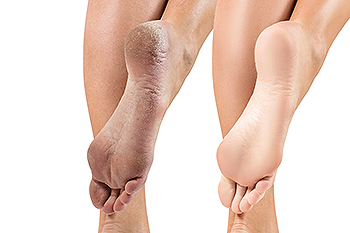
Cracked heels is a common foot condition that is unsightly and often causes pain and discomfort. There are several reasons for cracked heels to develop. Once this is known, effective preventive methods can be implemented. Weight gain, walking barefoot, or standing on hard surfaces for the majority of the day may cause cracked heels. Remedies can include having extra cushioning in the shoes if it is mandatory to stand all day, losing added weight, and wearing shoes that can protect the feet from outside environments. Some people have medical conditions that may lead to getting cracked heels, consisting of psoriasis or eczema. Taking prescribed medications may help the body’s immune system to improve, which may prevent cracked heels. If you have developed this condition, it is urged that you seek the counsel of a podiatrist who can recommend relief options, and inform you of additional prevention techniques.
Cracked heels are unsightly and can cause further damage to your shoes and feet. If you have any concerns, contact one of our podiatrists from Princeton Foot and Ankle Associates. Our doctors can provide the care you need to keep you pain-free and on your feet.
Cracked Heels
Cracked heels appear unappealing and can make it harder for you walk around in sandals. Aside from looking unpleasant, cracked heels can also tear stockings, socks, and wear out your shoes. There are several methods to help restore a cracked heel and prevent further damage.
How Do You Get Them?
Dry skin is the number one culprit in creating cracked heels. Many athletes, walkers, joggers, and even swimmers suffer from cracked heels. Age and skin oil production play a role to getting cracked heels as well.
Promote Healing
Over the counter medicines can help, especially for those that need instant relief or who suffer from chronic dry feet.
Wear Socks – Wearing socks with medicated creams helps lock in moisture.
Moisturizers – Applying both day and night will help alleviate dryness which causes cracking.
Pumice Stones – These exfoliate and remove dead skin, which allows for smoother moisturizer application and better absorption into the skin.
Change in Diet
Eating healthy with a well-balanced diet will give the skin a fresh and radiant look. Your body responds to the kinds of food you ingest. Omega-3 fatty acids and zinc supplements can also revitalize skin tissue.
Most importantly, seek professional help if unsure how to proceed in treating cracked heels. A podiatrist will help you with any questions or information needed.
If you have any questions, please feel free to contact our offices located in Princeton, and West Windsor, NJ . We offer the newest diagnostic and treatment technologies for all your foot care needs.
